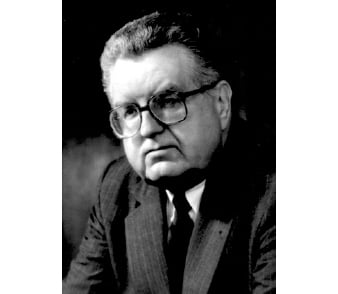Tom Roeser was perhaps Thomas to his parents and teachers and those who never met him. But for those of us fortunate enough to have glided within his ambit—even for a few moments—he was “Tom.”
There was no pretense about him. There was no standing at one or two removes from him. He was warm and friendly to all. His smile embraced a room, and his glance engaged everyone whose eye he caught.
It was fun to talk to Tom—not only because of what he knew, but because of the compelling way that he put it all together. He could weave a hundred strands of history and personality and pull them into a narrative that not only fascinated but helped his companions and his readers make sense of what otherwise would have been silly and senseless modernity.
And my goodness, Tom knew a lot. His memory about history and even about the remote years of his own life was so huge and detailed that, in the face of such erudition, one felt distinctly honored that he even listened to what others had to say.
I suspect Tom avoided the term conservative because he knew that the word did not convey the truth of the matter. He knew that the most conservative of people were often the most left wing and unwilling to convert to truth—the most intransigent and the most unyielding on any point, be it politics or religion. Tom knew that conservative was merely an adjective describing someone’s intractable personality.
But Tom talked of “authenticists.”
He wanted us to understand that there were certain implications of professing a religious belief, the first one being that, if the belief comes from proper authority (which, in the case of Christianity, would be God Himself), then it is therefore true, authentic. And if that belief is true, then it is not only worthy of belief but compels practice of that belief, as well as its study and its defense.
And Tom truly was an authenticist. He believed all that the Catholic Church historically has believed and taught, and he studied it and defended it—in good times as well as in bad. He was probably most hurt—and most undeserving of that hurt— when those who should have understood what he was talking about did not. And if he was hurt, it was because that criticism leveled against him implied that he was not a good Catholic. How unfair.
Tom would have been the first to say that he believed nothing more than what his own parents believed, nothing less than what they handed on to him—and that from generation upon generation in his family for a thousand years or more.
But if he was to be corrected for living authentically and speaking out about the implications of that belief, then I am sure he was nonetheless ready to join the long ranks of those who have suffered for the Faith.
This is precisely why Tom Roeser was such a friend of Chronicles and why he brought Chronicles staff often to speak before various Chicago groups and to appear on his radio program. Tom recognized in these Rockfordians his own understanding of history and humanity. He knew, as do readers of this magazine, that it is a matter of life and death for our society, our culture, our people to receive with reason and affection that which has been handed on to us.
Tom Roeser understood that traditional understandings of politics and religion have survived for the very reason that those traditions will help us survive in the face of modernity: They are authentic. Traditions are handed on because they come in one way or another—flawed or not—from the First Author. And the only way that we may live well in the present is to accept the Faith and the wisdom and the spirit of those who have gone before us.
Very few have articulated as well as Tom Roeser did how tradition, faith, and politics intersect. But we are grateful to have been his students. And we are assured he was on to something with his authentic beliefs, because he was full of life all his days and, at the end, was full of grace. What more could anyone ask—or receive?

Leave a Reply